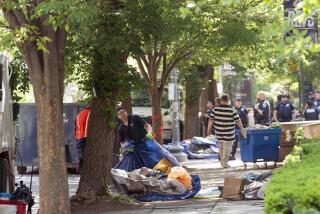Black professor’s arrest continues to rattle Boston area
- Share via
BOSTON — In a region where summer preoccupations normally revolve around baseball and the weather, blogs exploded Wednesday with people eager to weigh in on issues of race, class and police harassment.
Talk radio made room for little else. And coffee counters in beach communities from South Boston to Martha’s Vineyard buzzed with discussions about Harvard’s prominent African American studies professor, Henry Louis Gates Jr., who was arrested after attempting to enter his home.
Although Cambridge police had already dropped the charges against Gates, labeling the incident “regrettable and unfortunate,” the case continued to reverberate through an area that prides itself on a spirit of open-mindedness -- despite its history of racial strife.
“This is not dying down, and it’s not going to,” said Callie Crossley, a Boston TV and radio commentator.
It all started last Thursday when Gates, returning after a 20-hour flight from China, was unable to open the front door to his house a block from Harvard Square. While his limo driver tried to help him, a woman called police to say that “two black males with backpacks” were trying to break into a home. A confrontation ensued. Gates, 58, was led away in handcuffs. A police mug shot of one of the country’s leading black intellectuals soon surfaced on the Internet.
Gates is the director of Harvard’s W.E.B. Du Bois Institute for African and African American Research and edits an online magazine on black news and culture. He has written numerous books, produced documentaries for PBS and BBC, won a MacArthur “genius” grant and in 1997 was one of Time magazine’s “25 Most Influential Americans.” According to Harvard’s website, he holds 49 honorary degrees.
Gates’ arrest has resonated “with persons of color, in particular,” Crossley said, because “if it could happen to him, it could happen to any of us.”
An op-ed article in the Boston Globe on Wednesday by Georgianna Melendez, who co-directs a project aimed at making the state more friendly to minorities, cited a 2006 University of Massachusetts at Boston study that showed 75% of African Americans interviewed said race relations in the state were fair to poor. In addition, 17% of blacks surveyed said they had experienced racial discrimination by police within the previous year.
Those figures, coupled with the outrage after Gates’ arrest, should disabuse anyone of the notion of a peaceful, “post-racial” America, Melendez said.
“Just because we have a black governor in this state and a black president in America,” she said, “doesn’t mean the race issue has gone away.”
Around Boston, black community leaders criticized the Cambridge police officer who arrested Gates.
E. Denise Simmons, Cambridge’s first African American female mayor, said the incident highlighted the city’s need to find ways to address matters of race and class. And Harvard University President Drew Gilpin Faust issued a statement saying she was “deeply troubled” by Gates’ arrest.
From his home on Martha’s Vineyard, Gates told the Globe on Wednesday that he might sue Cambridge authorities. At the same time, a city police union gave “full and unqualified support” to Sgt. James Crowley, the arresting officer.
While there is some dispute over the events that led up to Gates’ arrest, Carol Rose, executive director of the ACLU of Massachusetts, said the incident offered a much-needed opportunity to discuss topics many people prefer to avoid.
“The amount of buzz that this has generated suggests that there are a lot of issues about race and class that go unspoken here until something like this opens the door, and then suddenly there is a flood of discussion -- on the radio, in the streets, on blogs and across the political spectrum,” Rose said.
But sustaining that dialogue is crucial, said Paul S. Bracy, a consultant who has advised corporations and the military on diversity for more than 30 years. “People have such difficulties in race and understanding the subtleties of racism,” he said.
Gates’ stature makes him “a spokesperson to some degree about race issues in this country,” said Bracy, who lives in the Martha’s Vineyard community of Oak Bluffs, a historically African American enclave. That standing may help provoke a kind of collective teaching moment, he suggested.
“When people talk about race, they tend to think about the bigots and the loudmouths,” he said. “Today, we are talking about the subtle beliefs and attitudes that come through in our behavior, that come from a racist education that is enculturated in our society.”
But, Bracy cautioned, such conversations are difficult.
“What I would like to see is some kind of ongoing dialogue, so that people feel more comfortable talking about it with their neighbors, so we can move forward. It’s critical to discuss this in a way that brings us closer together and not farther apart.”
More to Read
Sign up for Essential California
The most important California stories and recommendations in your inbox every morning.
You may occasionally receive promotional content from the Los Angeles Times.










